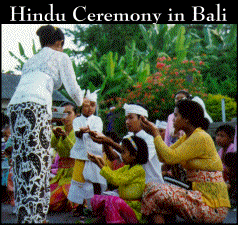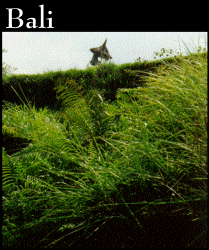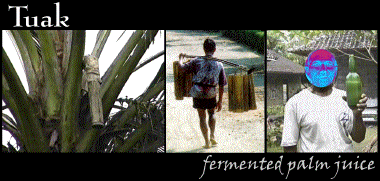
On the predominantly Hindu island of Bali, whose cultural antecedents date back to the Majapahit dynasty and whose inhabitants may count their ancestors amongst those who migrated to this island from Java when the dynasty fell to Muslims, names are an identity of caste. The four castes of Bali are, in order from the most revered caste, the Brahmana, the Ksatria, the Wesya, and the Sudra. The population of Bali is predominantly Sudra and the children of Sudra parents are typically given two names. The first name indicates their place in the order of family births and is limited to one of four different names:
| First born |
Wayan |
| Second born |
Made |
| Third born |
Nyoman |
| Fourth born |
Ketut |
The fifth born child will use the name "Wayan" and the names will be recycled with each successive birth. A man will be distinguished from a woman by the title of "Ni" for women and "I" for men. As a result, if a Sudra-Balinese couple's second born was a male and third born was a female, their names would be: I Made and Ni Nyoman.
Names for the other castes are even more limited as with the Ksatria caste, the names Gusti Ngurah (male) and Gusti Ayu (female) are typical. In the Wesya caste, the names are Dewa (male) and Desak (female). Ida Bagus (male) and Ida Ayu (female) are typical names for the priestly caste, the Brahmana. Family names are rare in Bali, though sometimes Brahmana will carry on a family name as in this name, Ida Bagus Kamang Trijata, where the family name is Trijata. One Balinese man told us that the Sudras are expected to speak to Brahmana in a more formal dialect than they use with members of their own caste.
 Other than in the ways already mentioned, caste identity is really of little relevance to daily life in Bali. It's importance is relegated more to the spiritual life of Balinese. I Made, a young Balinese man from the Sudra caste explained that it is highly desirable that Brahmana, the caste of priests, officiate over temple ceremonies. When we asked a Balinese woman we met, Ni Nyoman, to help us understand more about castes and village ceremonies, she began by explaining that villages may have different types of religious officials, but Brahmanas preside over the more important festivals. For example, Brahmana Podandas typically officiate at the ceremony for babies which is held six months after their birth, at weddings, and at cremations for the dead. The Sudra Pemangku may officiate at lesser ceremonies such as the baby's first year birthday (according to the Balinese calendar which has 35 days in a month), rice planting and harvesting ceremonies, and the Tilem (half moon) and Purnama (full moon) celebrations. White clothing predominates in temple ceremonies, black at funerals, and a variety of colors are worn at weddings.
Other than in the ways already mentioned, caste identity is really of little relevance to daily life in Bali. It's importance is relegated more to the spiritual life of Balinese. I Made, a young Balinese man from the Sudra caste explained that it is highly desirable that Brahmana, the caste of priests, officiate over temple ceremonies. When we asked a Balinese woman we met, Ni Nyoman, to help us understand more about castes and village ceremonies, she began by explaining that villages may have different types of religious officials, but Brahmanas preside over the more important festivals. For example, Brahmana Podandas typically officiate at the ceremony for babies which is held six months after their birth, at weddings, and at cremations for the dead. The Sudra Pemangku may officiate at lesser ceremonies such as the baby's first year birthday (according to the Balinese calendar which has 35 days in a month), rice planting and harvesting ceremonies, and the Tilem (half moon) and Purnama (full moon) celebrations. White clothing predominates in temple ceremonies, black at funerals, and a variety of colors are worn at weddings.


Ni Nyoman works in a restaurant in Bali's upland tourist area of Ubud. She works there for the money she would never be capable of earning in her village where her father works as a farmer. She hopes to earn even more money by improving her ability to speak English through dealing with the many tourists her job brings her into contact with. She works six days a week and returns home on the seventh. Ni Nyoman rents a room (presumably in a boarding house) with another woman who works in the kitchen at the restaurant where she works.


Made had worked in Kuta for seven years, but moved back to his village in the interior of Bali so he could live with his family. He also likes the village and nearby Ubud better because there are "less" tourists, prices are cheaper, and life is less busy. His house is on the family house complex which he shares with his parents; wife and child; and brothers and sister. The complex contains a pen for three small pigs; a small fenced-in area for a cow (to be sold, they are Hindu so they do not eat beef); a temple yard; a permanent outhouse; a rice storage house; a storeroom/fire-kitchen and village store; a ceremony structure which has a roof but only one wall - this is where Made's father sleeps; a small one-room house; and a newly constructed, larger house. Made's maternal cousins live in the house complex contiguous to his.
 Made's father is a farmer who takes pleasure in drinking tuak, a liquor distilled from palm tree juice. He also raises cocks for fighting, but rarely gambles (much of the prize in a cockfight in this poor village is winning the losing bird for a meal afterwards). As I talked with Made at the family compound, his father looked at me with a great urge to talk. There wasn't anything he needed to tell me or ask me, because he could have had his son translate. I suspect he just wanted to chat.
Made's father is a farmer who takes pleasure in drinking tuak, a liquor distilled from palm tree juice. He also raises cocks for fighting, but rarely gambles (much of the prize in a cockfight in this poor village is winning the losing bird for a meal afterwards). As I talked with Made at the family compound, his father looked at me with a great urge to talk. There wasn't anything he needed to tell me or ask me, because he could have had his son translate. I suspect he just wanted to chat.
 Made met his wife while they were both working in the tourist area of Kuta. She had lived in a small village on the outskirts of Denpasar and had been working in Kuta for about a year before they decided to get married and she moved to his village. It appeared to be important to Made that his wife was from a village, because he wanted her to live in his village and he believed it would be difficult for a woman who had not lived in a village before to adapt to the lifestyle. As an example, he explained that non-village people may have difficulty bathing in the cold water of a river (though they have a bathroom in their complex) and he also commented that village people are used to carrying heavy loads on their heads when they need to carry things such as laundry to the river or foods to or from the market. Since I knew that Made had lived in Denpasar for several years, I asked him if his wife seemed content living in a village. In response, he told me that she probably would have preferred to have lived in a city for a while longer since she had only been there for a brief time.
Made met his wife while they were both working in the tourist area of Kuta. She had lived in a small village on the outskirts of Denpasar and had been working in Kuta for about a year before they decided to get married and she moved to his village. It appeared to be important to Made that his wife was from a village, because he wanted her to live in his village and he believed it would be difficult for a woman who had not lived in a village before to adapt to the lifestyle. As an example, he explained that non-village people may have difficulty bathing in the cold water of a river (though they have a bathroom in their complex) and he also commented that village people are used to carrying heavy loads on their heads when they need to carry things such as laundry to the river or foods to or from the market. Since I knew that Made had lived in Denpasar for several years, I asked him if his wife seemed content living in a village. In response, he told me that she probably would have preferred to have lived in a city for a while longer since she had only been there for a brief time.
The rice fields in Made's village symbolize development in Bali. Made said that the rice fields are usually managed by the older men in the village and by those who can't get employment in the cash economy. When he told me this, I thought that rice farming was looked down upon by the younger villagers, but moments later, Made seemed to contradict himself. Because there is a shortage of field space for each family to hand down to their sons, they have to compete for the rights to the family field. Made explained that he had decided to earn a living outside of the village so that he wouldn't have to fight with his brothers over the rice field they owned.
Our meeting with Made was far to brief to understand how he had dealt with the two worlds he lived in: the village and the world of international tourism, but at many points in our conversations he seemed to have contradictory ways of living life brought on by the conflicts of these two worlds.
Made, who has a high school-level education, would like to be a tour guide, but these positions are strictly controlled by the government. Those who solicit employment as tour guides without government approval are subject to a severe fine. In order for Made to obtain government approval to become a tour guide, he would first have to complete a three year program consisting of two years English language instruction followed by one year of tour guide instruction. The cost for Made, who you'll remember is now a father and as the sole member of his family to be employed in the cash economy, is prohibitive. His decision not to invest in the three year program was also affected by his concern for the possibility that he would have to sacrifice so much and there would still be no guarantee that he could get a job when he was finished. When we visited his village, Made was in the process of enlarging his newly built house so that he could use it as a guesthouse for tourists, like some Australian tourists who had previously stayed with him. Made and some members of his family seem to have boundless entrepreneurial skills. He was also trying to obtain contracts for handmade products. One item he showed us was a small scrubber that he had contracted to make in bulk for a businessman from Canada. His family runs a small village store; his wife crotchets table clothes; and his mother makes rice cakes with rice, brown sugar, and coconut. Before we parted, he tried to offer us his services just one more time by proposing he act as our guide to see a volcano on the island.

